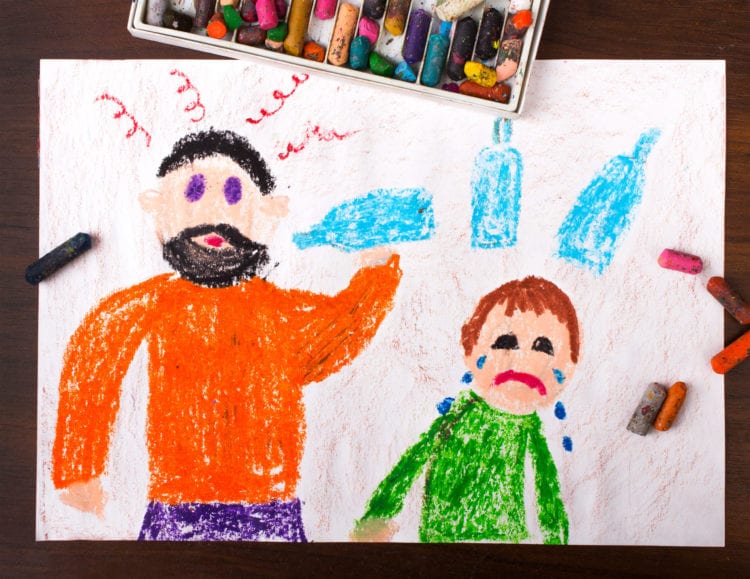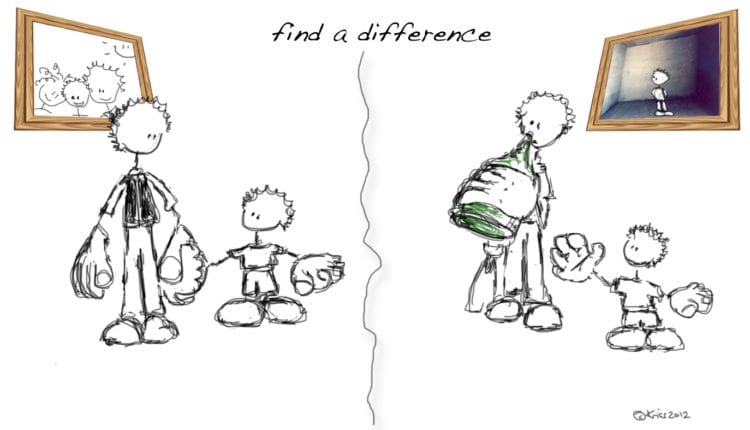Seeing the world with the eyes of vulnerable children
Every day, millions of children suffer because their parents – or other adults in their lives – are a threat to them. Parents who have alcohol problems, parents who use other drugs, parents with mental illness, parents who are violent.
Children often do what they can to help and to please their parents: sometimes that means putting a baby brother to sleep, doing all the household chores, comforting a sad parent or even cleaning up the puke or piss of an intoxicated parent.
Vulnerable children have different strategies to cope with their lives. Some thrive in school – a really difficult math problem helps you concentrate on something else than your situation at home! Some find a neighbour with whom they feel safe. Some go to football practise where they can meet other adults and other kids and just have fun.
Children from families with parental alcohol problems often fear long holidays, when they do not meet the safe and trusted adults in school, and at their leisure time activities. Many of them loathe holidays and longer time off.
The extent of the problem

The problem of children growing up in homes with parental alcohol problems is massive and so far has remained largely ignored despite the scale of the problem, the immense dangers to the health and wellbeing of affected children and the serious violations of children’s rights.
- In the United States, more than 10% of children live with a parent with alcohol problems.
- In the European Union, at least 9 million children grow up with parents who have alcohol problems – but not even all EU countries collect data to really know how many children and affected.
Sweden, where Junis and I are working to protect children from alcohol harm, is one of the countries that at least studies the situation best. Data shows that the problem is massive in Sweden:
- Ca. 20% of ALL children in Sweden – 430,000 children – have had at least one parent with an alcohol problem during their childhood; that’s every fifth child in our country;
- 3.5% of children have a parents that needed hospital care or that have passed away due to alcohol.
But this is a global problem.
In Germany, there are 2.65 million children below the age of 18 who grow up in homes with parents that have an alcohol use disorder. In addition there are up to 60.000 children living with parents that experience another drug addiction. All in all, every 6th child in Germany is affected by a parent with a substance use disorder.
Increased risk for vulnerable children’s health and rights
Right now COVID-19 presents a major threat in many countries. A way to prevent the virus from spreading is physical distancing and self-isolation in social solidarity. Conferences and concerts are cancelled. Countries are closing their boarders. People who can are asked to work from home. In many countries schools are closing. It is all for the purpose of keeping us and other people in society safe.
But what happens when children are forced to stay at home in a dangerous setting? Right now, the family might also suffer from an even greater stress than during a planned holiday: fear of catching the virus, the adults might fear loosing their jobs, which in many cases would be an economical disaster. That stress might be very dangerous to the children.
As societies are going into hibernation, vulnerable children have nowhere else to go than their dangerous homes, none else to turn to than unpredictable adults in their homes.
- For instance, in the United States, 13% of child abusers are under the influence of alcohol.
- In Europe, 16% of all cases of child abuse and neglect are alcohol-related.
Alcohol fuels and exacerbates child maltreatment, and physical and sexual abuse and alcohol is a major factor in domestic violence.
We know that parents have an immense influence over their children’s behavior during adolescence and on their children’s well- being through the life-course. Adolescents growing up with parents who have substance use problems are more likely to turn to self-destructive behaviors such as suicide attempts. The effects of parental substance use disorders can lead to the following problems in their children:
- Mental health problems,
- Relationship problems,
- Financial problems,
- Family problems, and
- Imitation of risky behaviors.
A British study showed for example that, compared to other kids, children of parents with alcohol problems are twice as likely to experience difficulties at school, three times more likely to consider suicide, five times more likely to develop eating disorders, four times more likely to develop alcohol use disorders themselves.
These adverse childhood experiences are likely to increase and become more severe during times of home quarantine and social isolation that most vulnerable children are now enduring.
Considerations to protect the health and rights of vulnerable children

So what should we do?
- When doing a risk calculation of closing schools, please also take into consideration the potential consequences of vulnerable children being put at even greater risk at home.
- Talk openly with all children in class or in the group – all, because you do not always know who has a hard time at home. Make sure that all children have a way to connect with a trusted teacher or leader.
- Try to find a way to regularly check in with pupils/kids.
- If possible, keep some activities open.
As an example: Many local clubs of Junis are doing what they can to keep going during the pandemic. We are cancelling larger activities like discos, but if it is possible we invite children (with no symptoms of cold etc, of course) to activities with fewer participants. A local group invites to movie evenings, since they have a large hall and usually rather few children, so it is possible to spread out. Many groups apply a new routine at activities: everyone washes their hands thouroughly when they arrive and right before they leave, and in between the leaders suggest games where you do not touch, and if possible: they play outside.
Other alternatives to provide safe and enabling spaces for children are:
- Can you create online fun where kids can connect with you and/or each other?
These online fun activities can be about challenges to include doing exercises outside or inside; or fun assignments which can be reported back to the group; or mysteries to solve in small online-groups together; or letting the kids help out in creating new challenges for each other! - In many countries there are helplines, helpchats and other forms of online support. Spread information about them to all children.
If you are in charge of one: is it possible to prolong opening hours if needed? Can you make sure to do extra promotions of the helpline and other services to reach even more children?
Children in general are not a risk group of Covid-19. But vulnerable children, such as kids where adults have substance use problems, are a major risk group seriously affected by the measures taken by society to fight the spread of the virus.
Let us all help to consider the needs and rights of the most vulnerable children. And let us all help to keep children safe!
